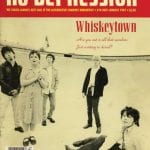Ramblin’ Rose: The Life And Career Of Rose Maddox
This biography of one of country music’s enduring treasures succeeds on several levels — as a quintessentially American tale of restlessness and ambition, a primer on the birth of the Bakersfield country sound, and, last but decidedly not least, such a delightful story that you have to keep reminding yourself it’s not fiction.
Maddox and her parents and brothers headed to California from their native Alabama during the Great Depression, driven by the determination of the overbearing matriarch, Lula. Desperate to escape from the farm work that was their lot, Rose and her five brothers formed a band, though most of the men didn’t have a clue about how to play. They quite literally learned on the job.
The family band — augmented by other musicians, most notably the great guitarist Roy Nichols, who joined up at 16 — went on to produce a brand of hillbilly honky-tonk that was like nothing ever heard before: wild and raucous, teetering on the edge with Rose’s crazed vocals, the wise-ass commentary of Fred, and the maniacal cackle of Cal.
Whiteside describes the sound perfectly with his discussion of the song “George’s Playhouse Boogie”: “It was hot, fast, hard roadhouse music that bore little relation to the musical approach of most of their contemporaries…. It was very close to a rock & roll sound.”
Suffice it to say that this music, pushing 50 years old, still sounds ahead of its time.
Whiteside’s research is impressive. It is especially providential that he managed to interview brother Fred extensively before his death in 1992. Fred was a born storyteller and he really piled it on to his willing audience of Whiteside, who has the sense to understand Fred may be pulling his leg at times. But hell, you’ve got to hope some of his stories are true — such as the one about a young Elvis deciding that one day he was “gonna have me a pink jacket” after seeing Fred in one at the Louisiana Hayride.
Rose herself has rich memories to share, though she clearly conveniently “forgot” some details that were unpleasant and soft-pedals others that she considers no one else’s damn business. One of the best of the latter is her squandering of $100,000 in Vegas during a “supercharged streak of carousing” with Jerry Lee Lewis in the late ’60s. Rose admits she “fell hard for Jerry Lee” but refuses, beyond a “Cheshire Cat grin,” to acknowledge anything more about their relationship. (Rose does confess that Johnny Cash pursued her when she was a part of his road show; she rebuffed his advances and left the show in 1961. “And that’s when he hired June Carter,” Rose adds tartly. “You know what happened then.”)
Whiteside’s book is chock full of such delightful stories; his writing is engaging and authoritative. An excellent discography is included.




